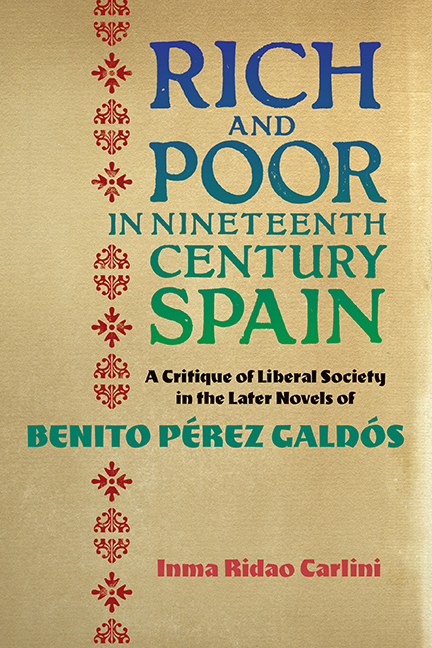 Rich and Poor in Nineteenth-Century Spain
Rich and Poor in Nineteenth-Century Spain Book contents
- Frontmatter
- Contents
- Acknowledgements
- Abbreviations
- Introduction
- 1 Changing Fortunes and the Financial World in Galdós's Lo prohibido
- 2 From Usurer to Marqués: Lending and Social Advancement in the Torquemada Novels
- 3 Revolution and the Politics of Religion in Ángel Guerra
- 4 The cuestión social in Misericordia
- Afterword
- Bibliography
- Index
2 - From Usurer to Marqués: Lending and Social Advancement in the Torquemada Novels
Published online by Cambridge University Press: 05 July 2018
- Frontmatter
- Contents
- Acknowledgements
- Abbreviations
- Introduction
- 1 Changing Fortunes and the Financial World in Galdós's Lo prohibido
- 2 From Usurer to Marqués: Lending and Social Advancement in the Torquemada Novels
- 3 Revolution and the Politics of Religion in Ángel Guerra
- 4 The cuestión social in Misericordia
- Afterword
- Bibliography
- Index
Summary
As we saw in the previous chapter, Galdós explores in Lo prohibido both the materialistic ethos of the Restoration bourgeoisie and the sources of its wealth, which can be traced to events such as the economic boom of the 1850s, the Cuban colonial trade and the First Carlist War (1833–40). In the four novels of the Torquemada series – Torquemada en la hoguera (1889), Torquemada en la cruz (1893), Torquemada en el purgatorio (1894) and Torquemada y San Pedro (1895) – Galdós follows the social ascent of the usurer Torquemada, from his working-class roots to the top layer of the Madrid financial elite. As in the case of the characters whose financial histories are provided by José María in Lo prohibido, Torquemada's trajectory parallels the socio-economic transformations that took place in Spain as the Old Regime order gave way to the capitalist system of liberal society. In particular, Galdós highlights the role of Mendizábal's desamortización in the making of Spain's new elite, a theme that, as we will see in the next chapter, is also explored in Ángel Guerra (1891). The complexity of the Torquemada novels allows for multiple interpretations, and they have been studied from many different perspectives: social, psychological, philosophical and religious. Critics such as Scanlon (1976) and Folley (1978) consider that a dichotomy between material and spiritual values underpins the series's narrative, and point to Galdós's indictment in the novels of the inversion of moral values that, in his view, characterises modern society. More recently, Fuentes Peris (2007) has focused on Galdós engagement in the Torquemada novels with contemporary social debates on political economy and public health: in particular, with notions of profit and utility versus waste. This chapter, which explores further socio-economic aspects of the novels, aims to offer a detailed study of the Torquemada series in the context of the shifting of power structures that took place in Spain from the 1830s onwards, and which constitute the backbone of the narrative of Torquemada's social ascent.
Usury in Nineteenth-Century Spain
In her study of credit and usury in Spain, Pérez Picazo refers to the second half of the nineteenth century as the ‘siglo de la usura’. She argues that the number of usurers, already an established presence in local economies, increased dramatically during this period, as did the volume of their loans (Pérez Picazo 1987: 17).
- Type
- Chapter
- Information
- Rich and Poor in Nineteenth-Century SpainA Critique of Liberal Society in the Later novels of Benito Pérez Galdós, pp. 55 - 96Publisher: Boydell & BrewerPrint publication year: 2018


